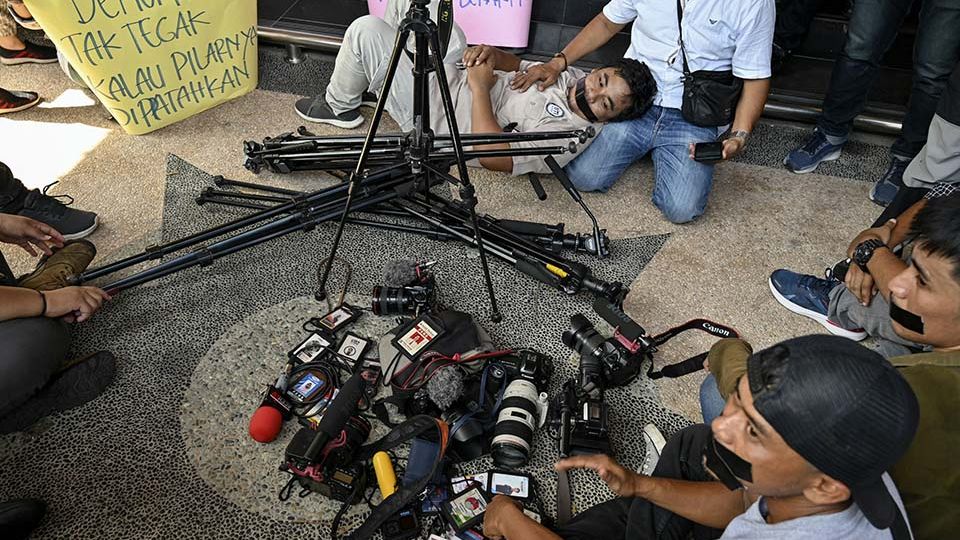May 8, 2025
JAKARTA – Journalist associations have called for authorities to ensure a level playing field between local media companies and global digital platforms through stronger national-level regulations, as mass layoffs continue to ravage local firms.
On Monday, House of Representatives Commission I overseeing communications and information held a meeting with the government-backed Indonesian Journalists Association (PWI), the Alliance of Independent Journalists (AJI) and the Indonesian Video Streaming Association (AVISI) to hear their concerns about the state of local media.
Agus Sudibyo of the PWI blamed the lack of policies regulating global digital platforms that he said allowed them to slowly drive local media outlets, from print to television companies, out of business.
He noted that the lack of regulations led to unfair profit sharing, non-transparent payments for content produced by local publishers on global digital platforms, a lack of data sharing and a monopoly on advertorials by the platforms.
Tech giants such as ByteDance, which owns video sharing platform TikTok, Google and Meta, which owns Facebook and Instagram, have a monopoly of “over 75 percent of the ads” in Indonesia, according to Agus.
“This is not only an issue of media sustainability, but also of our economic and even national sovereignty,” Agus told lawmakers on Monday.
Read also: Decline in Indonesia’s press freedom alarming
He pointed to the wave of mass layoffs recently taking place in over a dozen local media companies in recent months, such as print-turned-online news outlet Republika, private television stations tvOne and Kompas TV and state-owned radio station RRI, with hundreds of workers affected.
Big media companies owned by famed Indonesian businesspeople, such as Emtek and MNC Group, faced the same fate, having laid off a total of at least 100 employees in recent weeks.
The Press Council previously noted that the recent numbers of workers laid off by media companies might be just the tip of the iceberg, adding that verified local media outlets hit hardest by the poor economic state “might have already stopped operating”.
Stronger law needed?
The associations urged lawmakers to consider a more holistic regulation against global digital platforms.
Aside from following the European Union’s Digital Services Act and Digital Markets Act, Agus suggested that provisions against “digital feudalism” caused by global platforms may be included in the undergoing revision of the Broadcasting Law, which would be stronger than prevailing regulations on publishers’ rights.
During the celebration of National Press Day last year, then-president Joko “Jokowi” Widodo announced the issuance of a presidential regulation mandating all digital platforms to negotiate partnerships with local media firms that could help provide them with financial benefits, including through paid licensing, revenue sharing or data sharing, among other approaches.
Concerns have grown that smaller media outlets may struggle to negotiate with the tech giants due to their lower traffic share, which is deemed an important bargaining chip.
But AJI secretary-general Bayu Wardhana argued that the Broadcasting Law should not regulate the digital realm.
“We are suggesting that the Broadcasting Law should focus on terrestrial broadcasting. Instead, there should be a new law regulating digital platforms that would become an umbrella for similar laws, including the Electronic Information and Transactions [ITE] Law,” Bayu said in the meeting.
He added that authorities should push for efforts to empower community-based broadcasting outlets and policies to decentralize broadcasting to help regional stations reaping financial benefits.
Read also: Indonesia slides in global press freedom index
Dadang Rahmat Hidayat, dean of Padjadjaran University’s School of Communications, said a stronger regulation would help protect not only the business, but also journalistic quality produced by local media firms, an aspect affected by there being fewer numbers of workers as companies start to rely more on technological advances.
Aside from digital platforms’ monopoly, he also noted that the government’s austerity measures, in which President Prabowo Subianto instructed ministries and institutions to cut up to Rp 306 trillion (US$18 billion) from this year’s state budget, may affect media firms’ revenue from advertising, exacerbating the layoffs.
“The media has no other funding source except from advertising, and most of them come from central government and local administrations,” Dadang told The Jakarta Post on Wednesday.
“With the austerity [measures], income for the media will surely decrease. So it’s important to maintain that ecosystem,” he continued.
Economic fragility contributed to Indonesia’s low score in the 2025 Press Freedom Index from media rights group Reporters Without Borders, which highlighted that financial instability faced by local media companies led to layoffs and salary cuts without sufficient economic protection for media workers.


